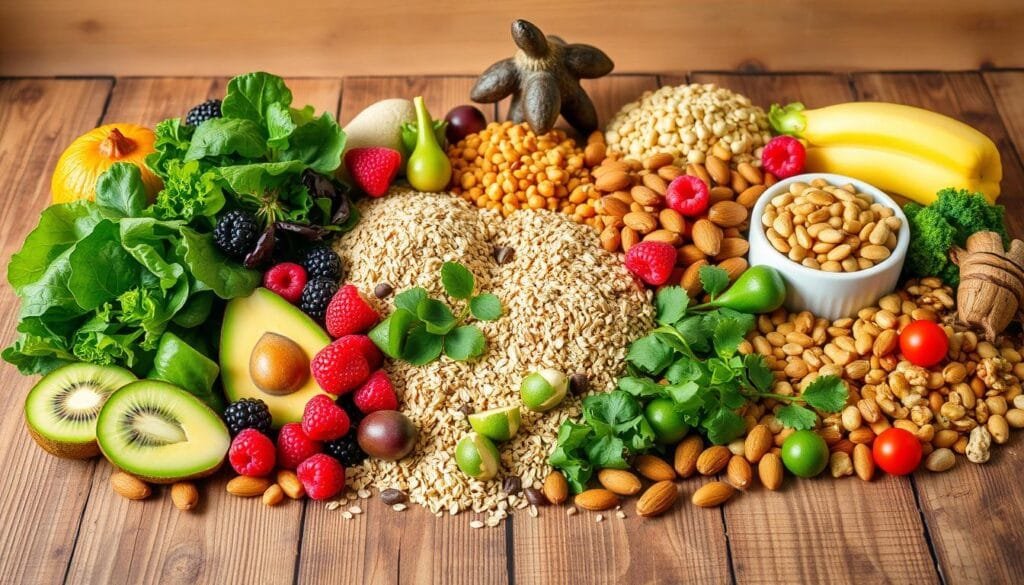Currently Empty: RM0.00
Struggling with sluggish digestion? You’re not alone. Around 16% of adults worldwide face similar challenges. Many turn to natural solutions like gut-friendly bacteria or plant-based nutrients for relief.
The gut microbiome plays a crucial role in overall wellness. Certain strains of beneficial bacteria may support smoother digestion, while dietary adjustments could enhance bowel regularity. But which approach works best?
Wellness Concept explores personalized strategies for digestive comfort. Their experts analyze scientific evidence from 24+ studies, including research on irritable bowel syndrome and pregnancy-related issues. Could tailored solutions make the difference?
For personalized advice, contact Wellness Concept at +60123822655 via WhatsApp.
Key Takeaways
- About 16% of adults experience digestive discomfort globally.
- The gut microbiome significantly impacts digestion and immunity.
- Different bacterial strains offer varying benefits for intestinal health.
- Dietary adjustments may complement microbial support for better results.
- Wellness Concept provides customized solutions based on scientific research.
Understanding Constipation: Causes and Symptoms
Bowel irregularities can disrupt daily life and overall wellness. For many, infrequent or painful stools become a recurring challenge. The National Institutes of Health (NIH) defines constipation as fewer than three bowel movements weekly, often accompanied by hard, lumpy stools.
Recognizing the Signs
Common symptoms include:
- Abdominal pain or cramping
- Bloating and discomfort
- Feeling of incomplete evacuation
What Triggers Digestive Slowdowns?
Several factors contribute to irregularity:
- Lifestyle: Sedentary habits or inadequate hydration.
- Diet: Low intake of plant-based foods.
- Medications: Opioids, antidepressants, or iron supplements.
- Aging: Slower gut motility in older adults.
Chronic conditions like *IBS* account for up to 38% of persistent cases. Pregnancy and chemotherapy may also slow digestion temporarily.
Do Probiotics or Fiber Help with Constipation?
Many people seek natural solutions for better digestive comfort. Two approaches—supporting gut flora and adjusting dietary intake—often come into focus. Both methods aim to enhance regularity and ease discomfort.
How Beneficial Bacteria Influence Digestion
Certain strains of live microorganisms may balance the gut microbiome. They work by:
- Restoring healthy bacteria levels
- Reducing intestinal inflammation
- Improving stool consistency
A 60-day study with 150 IBS patients showed 60% experienced more frequent bowel movements after consistent use. Not all strains work equally, so choosing the right one matters.
Fiber’s Dual Role in Digestive Health
Dietary fiber comes in two forms, each with unique benefits:
- Soluble (oats, beans): Absorbs water to soften stools
- Insoluble (whole grains, veggies): Adds bulk to promote movement
Research suggests combining high-fiber foods with probiotic-rich options may enhance results. However, relying solely on supplements without dietary changes often falls short.
The Science Behind Probiotics and Constipation Relief
Scientific evidence continues to reveal how gut bacteria influence digestive health. Specific strains may enhance bowel regularity by balancing the microbiome. Clinical trials provide measurable insights into their effectiveness.
Key Studies and Findings
A 2022 review found L. casei Shirota improved stool consistency in 78% of participants. Another trial with 60 pregnant women showed consuming 300g of probiotic yogurt daily increased bowel movements by 40%.
“96% of chemotherapy patients reported relief after 4 weeks of B. lactis supplementation.”
Top Strains for Digestive Support
Not all microbial strains work equally. These stand out in research for promoting regularity:
| Strain | Benefits | Study Duration |
|---|---|---|
| Bifidobacterium lactis | Softens stools, reduces transit time | 4 weeks |
| Lactobacillus plantarum | Reduces bloating, supports motility | 6 weeks |
| S. thermophilus | Enhances gut barrier function | 3 weeks |
Dosage matters—most trials used 1–10 billion CFU daily. Experts recommend a 3–4 week evaluation period to gauge results. Note: Pediatric studies show mixed outcomes, suggesting individualized approaches.
Fiber’s Role in Promoting Regular Bowel Movements
A well-balanced diet plays a crucial role in maintaining digestive harmony. Among its key components, dietary fiber stands out for its ability to support regularity and gut health. Understanding the different types and their effects can help tailor dietary choices for optimal results.

Soluble and Insoluble: A Digestive Duo
Soluble fiber dissolves in water, forming a gel-like substance that softens stools. Oats, apples, and chia seeds are excellent sources. In contrast, insoluble fiber adds bulk to stools, speeding up transit time. Whole grains and broccoli are packed with this type.
| Type | Function | Top Sources |
|---|---|---|
| Soluble | Softens stools, retains water | Oats, lentils, berries |
| Insoluble | Adds bulk, promotes movement | Brown rice, carrots, nuts |
Smart Ways to Increase Intake
Gradual changes prevent bloating. Start with small portions of lentils or flaxseeds, then increase weekly. Pairing high-fiber foods with water optimizes their effects—aim for 25–30g daily.
A ZOE study found diets rich in these nutrients correlated with 15% more regular bowel movements. For sustained benefits, consistency matters more than occasional high doses.
Potential Risks and Side Effects
Natural remedies offer relief, but they aren’t risk-free. Even gut-friendly options like microbial supplements or high-fiber diets may trigger discomfort in some individuals. Understanding these pitfalls ensures safer, more effective choices.
Limitations of Microbial Support
While many benefit from probiotics, they aren’t universally suitable. Temporary side effects like gas or nausea may occur during adjustment. However, certain conditions warrant caution:
- SIBO: May worsen bacterial overgrowth.
- Immunosuppression: Risk of infections from live strains.
- Post-surgery: Delayed use avoids complications.
Consult a doctor before combining these supplements with medications, especially antibiotics.
Fiber: Too Much of a Good Thing?
Exceeding 70g daily may cause bloating, cramps, or even intestinal blockage. Gradually increasing intake with hydration minimizes risks. Below, compare fiber types and their potential impacts:
| Type | Benefits | Overconsumption Risks |
|---|---|---|
| Soluble | Softens stools | Gas, diarrhea |
| Insoluble | Promotes motility | Abdominal pain |
Note: Pair fiber-rich foods with water to reduce side effects. Persistent discomfort warrants professional advice.
Wellness Concept’s Approach to Gut Health
Every gut is unique, requiring personalized approaches for optimal health. Wellness Concept combines scientific research with individualized care to address digestive challenges. Their methods focus on long-term solutions rather than temporary fixes.

Tailored Plans for Lasting Relief
Clients receive customized strategies based on comprehensive assessments. These may include:
- Stool analysis to identify microbial imbalances
- Dietary adjustments targeting soluble/insoluble fiber ratios
- Strain-specific probiotics matched to symptoms
“After 6 weeks with Wellness Concept, I went from 1 to 4 weekly bowel movements—life-changing!”
Services Designed for Results
Weekend slots are available for working professionals. Reach out via WhatsApp (+60123822655) during these hours:
- Mon–Fri: 9:30 AM–6:30 PM
- Sat–Sun: 10 AM–5 PM
Conclusion
Finding lasting relief requires understanding your body’s unique needs. Specific bacterial strains and fiber types support regularity, but results vary. What works for one person may not suit another.
Combining dietary adjustments with expert guidance often delivers the best outcomes. Wellness Concept tailors solutions based on microbiome testing and clinical research. Their team identifies the right balance for your gut health.
Ready for personalized advice? Message them on WhatsApp (+60123822655) to schedule your assessment. Small changes today can lead to lasting comfort tomorrow.
FAQ
What are the common causes of constipation?
Poor diet, dehydration, lack of exercise, and certain medications often contribute to irregular bowel movements. Stress and underlying health conditions like irritable bowel syndrome (IBS) can also play a role.
Can gut bacteria affect digestion?
Yes. A balanced microbiome supports smoother digestion. Imbalances may lead to bloating, discomfort, or slower bowel movements. Research suggests certain strains, like Bifidobacterium, may improve gut function.
How does fiber work for constipation relief?
Fiber adds bulk to stool and helps it pass more easily. Soluble fiber absorbs water, while insoluble fiber speeds up transit time. Foods like oats, beans, and whole grains are great choices.
Are there risks to taking too much fiber?
Overdoing it can cause bloating, gas, or even worsen constipation if water intake isn’t increased. Gradually adding fiber and drinking plenty of fluids helps avoid side effects.
Which probiotic strains are best for constipation?
Studies highlight Lactobacillus and Bifidobacterium strains for easing symptoms. Look for supplements with these or try fermented foods like yogurt and kimchi.
When should someone see a specialist for constipation?
If symptoms last more than two weeks, include severe pain, or blood in stool, consulting a healthcare provider is crucial. Wellness Concept offers personalized consultations to address gut health concerns.



